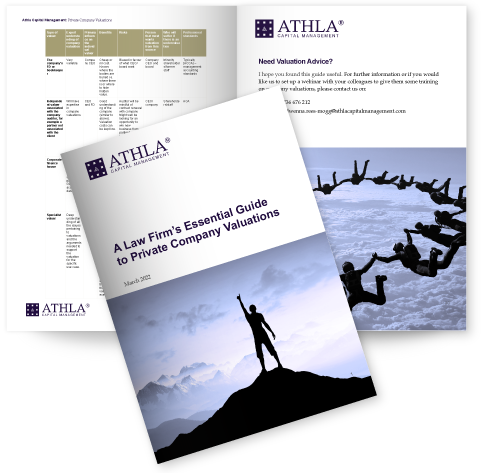The FCA reports on valuations
March 18, 2025

“A less frequent valuation cycle risks stale valuations – a valuation that no longer reasonably reflects the current conditions of an investor’s holdings.”
Did you see that the FCA published its findings on private markets valuations on 5th March? You can read the full findings here: Private market valuation practices | FCA. However, if you just want the highlights read on!
Background
The research was constrained to 36 firms in Phase 1.
What is interesting was the limited number of Venture Capital and Private Equity firms contacted versus the entire UK universe which numbered 547 according to Beauhurst in 2023.
The overarching findings from the FCA were:
“We expect firms to consider the findings from this review and identify any gaps in their approach, taking into account their size and the materiality of identified gaps. In particular, firms should consider whether they should make improvements in:
- The governance of their valuation process.
- Identifying, documenting, and addressing potential conflicts in their valuation process.
- Ensuring functional independence for their valuation process.
- Incorporating defined processes for ad hoc valuations.
Of particular note was the requirement that full-scope UK AIFMs must ensure they establish appropriate and consistent procedures to perform a proper and independent valuation of a fund’s assets and NAV (FUND 3.9.4R) and have written policies and procedures that ensure a sound, transparent, comprehensive and appropriately documented valuation process (Article 67(1)Link is external of the AIFMD L2 Regulation).
Use of third-party valuation advisers
The FCA stated “Third-party valuation advisers can provide additional independence and expertise. The value of their services as an additional control will depend on how firms use and engage with these providers. As third-party valuation advisers provide different levels of service, firms should make their investors aware of the specific nature of the service provided, its strengths and its limitations.
Full-scope UK AIFMs must use external valuers when not performing the valuation themselves (FUND 3.9.7R). We found that this arrangement was rare, and instead many firms used the services of third-party valuation advisers while retaining responsibility for valuation.”
The FCA stated that “firms that demonstrated good practice had used third-party valuation services after identifying material conflicts of interest such as calculating fees, pricing redemptions and subscriptions or asset transfers using valuations. These firms also considered the limitations of the service provided, took steps to ensure the independence of the third-party valuation adviser and noted that the firm retained responsibility for valuation decisions.
Where firms use third-party valuation advisers, their use should be appropriately overseen and potential commercial conflicts need to be identified and managed. Firms should consider the strengths and limitations of the service provided and disclosing the nature of the services used to investors, including portfolio coverage and frequency.”
Ad hoc valuations
The FCA made some comments on ad hoc, or out-of-cycle, valuations are those made outside the regular valuation schedule. It considered they can reduce the risk of stale valuations if material events cause significant changes in market conditions or how an asset performs.
It stated “An ad hoc process demonstrates that a firm has appropriate procedures in place where there is a material risk of an inappropriate valuation (Article 71(2)Link is external of the AIFMD L2 Regulation). This allows the firm to demonstrate that all assets held by a fund are fairly and properly valued and that the portfolios of funds are properly valued (Article 71(1)Link is external of the AIFMD L2 Regulation) at all times.”
FCA’s recommended actions
These were the FCA’s recommended actions
- Firms should consider whether their governance arrangements ensure there is clear accountability for valuation and robust oversight of the valuation process, including accurate and detailed record-keeping of how valuation decisions are reached.
- The FCA expects firms to consider if valuation-related conflicts are relevant and if they are, document them and the actions to mitigate or manage them.
- It expects firms to assess whether they have sufficient independence in their valuation functions and the voting membership of their valuation committees to enable and ensure effective control and expert challenge.
- It expects firms to ensure their valuation policies are sufficiently comprehensive so that their valuation process is clear and adherence to it can be tested.
- Firms should consider whether they document valuation models consistently and clearly across assets, engage with auditors appropriately and properly consider insights from backtesting to inform their valuation approach.
- Firms might also consider whether they can make investments in technology to improve consistency and reduce the risk of human error in their valuation process.
- Firms should consider incorporating a defined process for ad hoc valuations to mitigate the risk of stale valuations. A defined process includes the thresholds and types of events that would trigger ad hoc valuations.
- Firms should consider where they can improve their reporting to and engagement with investors on valuations, including providing detail on fund-level and asset-level performance, to increase transparency and investors’ confidence in their valuation process.
- The FCA expects firms to apply valuation methodologies and assumptions consistently and make valuation adjustments solely on the basis of fair value. We expect valuation committees and independent functions to focus on these adjustments to ensure they reach robust decisions.
- It also considers that, where relevant, firms should consider using industry guidelines to ensure their approach is in line with standard market practice. Firms should also consider whether they should apply secondary methodologies to corroborate their judgement.
FCA’s recommendations on good practice
The FCA’s findings on good practice are laid out below. Some of the most interesting comments from our perspective are highlighted in bold.
- Good practice includes documenting conflicts of interest and clearly separating unrealised and realised investments in marketing materials, making clear that unrealised performance was based on the firm’s approach to valuations, and presenting the components of unrealised value.
- Firms can demonstrate good practice by seeking additional assurance for in-house valuations. Usually, additional independence and expertise can be obtained through engaging a third-party valuation adviser.
- Most firms used valuation templates to ensure a consistent and clear approach.
- Most firms demonstrated good practice by clearly highlighting changes in inputs, assumptions and value, as well as providing qualitative information on the context and performance of the asset. Some also maintained logs capturing assumption changes across assets.
- Some firms said they had introduced an automated third-party valuation software to improve consistency and reduce the risk of human error.
- Firms demonstrating good practice described how they support external auditors to perform their role by involving them in the valuation process. Examples included inviting auditors to observe valuation committee meetings, raising auditor challenges at those meetings and taking proactive measures of managing conflicts of interest involving the audit service provider, such as rotating audit partners and audit firms.
- Firms demonstrating good practice described using the results of backtesting to inform their approach to valuations, such as identifying insights about current market conditions, and potential limitations in models, assumptions and inputs.
- Most firms demonstrated good practice by reporting quantitative and qualitative information on performance at both the fund and asset-level, as well as holding regular conference calls with investors.
- Some firms enhanced this reporting by including a ‘value bridge’ in their reporting to investors showing the different components to changes in value of the NAV or assets. For example, we saw illustrations of how much change was attributable to a portfolio company’s underlying earnings, the valuation multiple used, cash proceeds and exchange rate changes. These examples helped illustrate the extent to which changes in value were driven by changes in market movements and valuation judgements compared to changes in a company’s underlying financial performance.
- Firms demonstrating good practice were those that demonstrated use of another established methodology as a sense check.
Most common valuation methodologies
It was interesting to see that different types of assets lead managers to taking a a different approach to the use of valuation methodologies.
The FCA research found the most common methodologies are:
- Private equity: Most firms used the market approach as their primary methodology. Half of these firms used only the market approach while the other half used the income approach as a joint primary or infrequent secondary approach. Only a few firms used the income approach as their primary methodology
- Venture capital: All firms used the market approach as their primary methodology
- Infrastructure equity: All firms used the income approach as their primary methodology, with a small number also using the market approach
- Private debt: Firms used both the income and the market approach as their primary methodology. In Phase 2, we found this often referred to a coverage test and a yield analysis
- Infrastructure debt: All firms used the income approach as their primary valuation methodology.
It’s not stopping here:
The FCA stated “We will build on our findings here with further work focusing on conflicts of interest in private markets, as discussed in our recent portfolio letter. Rapid growth in private markets and asset managers operating multiple intersecting business lines, continuation funds, co-investment opportunities or partnering with other financial institutions may increase the potential for conflicts. Good management of them is critical to confident investment in private markets, and we will work to support that.
We will consider the findings of this work as we review assimilated law that implemented the Alternative Investment Fund Managers Directive (AIFMD) in the UK. This forms part of the work to repeal and replace assimilated law with rules in the FCA Handbook. We are working towards streamlining the regulatory requirements to make them more proportionate and tailored to the UK market.
We will also share our findings to inform the work of other bodies, such as the Bank of England’s work on Non-Bank Financial Institutions, and IOSCO Committee 5’s review of the 2013 Principles for the Valuation of Collective Investment Schemes. We are contributing to the IOSCO review, to support the use of proportionate and consistent valuation standards globally in private markets.”
Athla conclusions
It is very encouraging that the FCA is taking this issue so seriously and we know that it is also engaged with the HMRC SAV team.
What we are seeing is a convergence of opinion as to how the valuation issue should be addressed for private companies and assets.
Possibly the biggest issue we can see emerging is the issue of proper independence around a valuation so that investors can trust it.
The FCA is largely expecting fund managers to apply their professional skills to ensure that asset valuations are correct, but it appears that there will be two directions of travel
- The increasing automation of valuations or at least standardisation of approaches within any one firm. What is not clear is how differences in valuation by different investors on a company’s cap table will be addressed.
- The increasing concerns about the accuracy of valuations and how this can be tested whether through the use of third party valuations, back testing, ad hoc valuations and/or oversight of valuation committees.
As always with research it can generate more questions. If you would like to discuss some of the FCA’s recommendations on actions and good practice by regulated firms and how this might impact more widely on valuation projects, please let us know.


